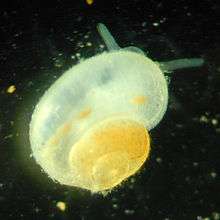Cochliopidae
Cochliopidae is a family of small freshwater snails with gills and an operculum, aquatic gastropod mollusks. Paludestrina d'Orbigny, 1840 is an archaic synonym,[2] and has been placed on the Official Index of Rejected and Invalid Names by ICZN Opinion 2202.[3]
| Cochliopidae | |
|---|---|
 | |
| A live individual of Antrobia culveri | |
| Scientific classification | |
| Kingdom: | |
| Phylum: | |
| Class: | |
| (unranked): | |
| Superfamily: | |
| Family: | Cochliopidae Tryon, 1866 |
| Diversity[1] | |
| 246 freshwater species | |
| Synonyms | |
|
Semisalsinae Giusti & Pezzoli, 1980 | |
This family is in the superfamily Truncatelloidea and in the clade Littorinimorpha (according to the taxonomy of the Gastropoda by Bouchet & Rocroi, 2005).
Description
Cochliopidae snails are characterized by sharp, elongated spire-like structures, and can be found in rivers or brackish water.[2]
2005 taxonomy
The family Cochliopidae consists of 3 subfamilies (according to the taxonomy of the Gastropoda by Bouchet & Rocroi, 2005):[4]
Genera
Liu et al. (2001)[5] have recognized 34 genera with more than 260 species within the subfamily Cochliopinae.[5]
Strong et al. (2008)[1] have recognized 246 freshwater species within Cochliopidae.[1]
Genera within the family Cochliopidae include:
subfamily Cochliopinae
- Aphaostracon F. G. Thompson, 1968
- Coahuilix Taylor, 1966
- Cochliopa Stimpson, 1865 - type genus of the family Cochliopidae[4]
- Cochliopina Morrison, 1946
subfamily Littoridininae
- Antrobia Hubricht, 1971 - with the only species Antrobia culveri Hubricht, 1971[6] - Tumbling Creek cavesnail
- Littoridina Souleyet, 1852
- Pseudotryonia Hershler, 2001[7]
subfamily Semisalsinae - there are three genera in the subfamily Semisalsinae[8]
subfamily ? (either Cochliopinae or Littoridininae)
- Aroapyrgus H. B. Baker, 1931
- Balconorbis Hershler & Longley, 1986
- † Carinulorbis Yen, 1949
- Chorrobius Hershler, Liu & Landye, 2011[7]
- Dyris Conrad, 1871 - it has extant species and also 26 species in Miocene Pebas Formation[9]
- Emmericiella Pilsbry, 1909
- Eremopyprgus Hershler, 1999[10][11]
- † Feliconcha Wesselingh, Anderson & Kadolsky, 2006 - two species from Miocene of the Pebas Formation[9]
- (probably extant)[9] Glabertryonia Wesselingh, Anderson & Kadolsky, 2006 - three species[9]
- Juturnia Hershler, Liu & Stockwell, 2002
- Lithococcus Pilsbry, 1911
- Mesobia F. G. Thompson & Hershler, 1991
- Mexipyrgus Taylor, 1966
- Minckleyella Hershler, Liu & Landye, 2011[7] - with the only species Minckleyella balnearis Hershler, Liu & Landye, 2011[7]
- Onobops Thompson, 1968[9]
- Pyrgophorus Ancey, 1888[9]
- Sioliella Haas, 1949
- Spurwinkia Davis, Mazurkiewicz & Mandracchia, 1982
- Texadina Abbott & Ladd, 1951
- Thalassobia Bourguignat in Mabille, 1877
Cladogram
A cladogram based on sequences of mitochondrial cytochrome-c oxidase I (COI) genes showing phylogenic relations of species within Cochliopidae:[5]
| Cochliopidae |
| ||||||||||||||||||||||||||||||||||||||||||||||||||||||||||||||||||||||||||||||||||||||||||||||||||||||||||||
References
- Strong E. E., Gargominy O., Ponder W. F. & Bouchet P. (2008). "Global Diversity of Gastropods (Gastropoda; Mollusca) in Freshwater". Hydrobiologia 595: 149-166. hdl:10088/7390 doi:10.1007/s10750-007-9012-6.
- Bourguignat, Jules René (1888-01-01). Iconographie malacologique des animaux mollusques fluviatiles du Lac Tanganika (in French). Impr. Crété.
- Bouchet, P. (2015). Paludestrina d'Orbigny, 1840. In: MolluscaBase (2015). Accessed through: World Register of Marine Species at http://www.marinespecies.org/aphia.php?p=taxdetails&id=558766 on 2015-12-12
- Bouchet, Philippe; Rocroi, Jean-Pierre; Frýda, Jiri; Hausdorf, Bernard; Ponder, Winston; Valdés, Ángel & Warén, Anders (2005). "Classification and nomenclator of gastropod families". Malacologia. Hackenheim, Germany: ConchBooks. 47 (1–2): 1–397. ISBN 3-925919-72-4. ISSN 0076-2997.
- Liu H.-P., Hershler R. & Thompson F. G. (2001). "Phylogenetic Relationships of the Cochliopinae (Rissooidea: Hydrobiidae): An Enigmatic Group of Aquatic Gastropods". Molecular Phylogenetics and Evolution 21(1): 17-25. doi:10.1006/mpev.2001.0988.
- Kabat A. R. & Hershler R. (1993). "The prosobranch snail family Hydrobiidae (Gastropoda: Rissooidea): review of classification and supraspecific taxa". Smithsonian Contributions to Zoology 547: 1-94. PDF.
- Hershler R., Liu H.-P. & Landye J. J. (2011). "Two new genera and four new species of freshwater cochliopid gastropods (Rissooidea) from northeastern Mexico". Journal of Molluscan Studies 77(1): 8-23. doi:10.1093/mollus/eyq033.
- Kroll O., Hershler R., Albrecht C., Terrazas E. M., Apaza R., Fuentealba C., Wolff C. & Wilke T. (2012). "The endemic gastropod fauna of Lake Titicaca: correlation between molecular evolution and hydrographic history". Ecology and Evolution 2(7): 1517-1530. doi:10.1002/ece3.280.
- Wesselingh F. P., Anderson L. C. & Kadolsky D. (2006). "Molluscs from the Miocene Pebas Formation of Peruvian and Colombian Amazonia". Scripta Geologica 1333: 19-290. PDF.
- Hershler R., Liu H.-P. & Landye J. J. (2002). "A new species of Eremopyprgus (Hydrobiidae: Cochliopinae) from the Chihuahuan desert, Mexico: Phylogentic relationships and biogeography". Journal of Molluscan Studies 68: 7-13. PDF.
- Hershler R. (1999). "A systematic review of the hydrobiid snails (Gastropoda: Rissoidea) of the Great Basin, western United States. Part II. Genera Colligyrus, Fluminicola, Pristinicola, and Tryonia". The Veliger 42(4): 306-337. PDF.
Further reading
- Hershler R., Davis C. L., Kitting C. L & Liu H.-P. (2007). "Discovery of introduced and cryptogenic cochliopid gastropods in the San Francisco Estuary, California". Journal of Molluscan Studies 73(4): 323-332. PDF.
- Hershler R. & Thompson F. G. (1992). "A Review of the Aquatic Gastropod Subfamily Cochliopinae (Prosobranchia: Hydrobiidae)". Malacological Review, Supplement 5: 1-140. pages 16–18.
- Wilke T., Haase M., Hershler R., Liu H.-P., Misof B. & Ponder W. (2013) Pushing short DNA fragments to the limit: Phylogenetic relationships of ‘hydrobioid’ gastropods (Caenogastropoda: Rissooidea). Molecular Phylogenetics and Evolution, 66: 715-736
External links
| Wikimedia Commons has media related to Cochliopidae. |
| Wikispecies has information related to Cochliopidae |